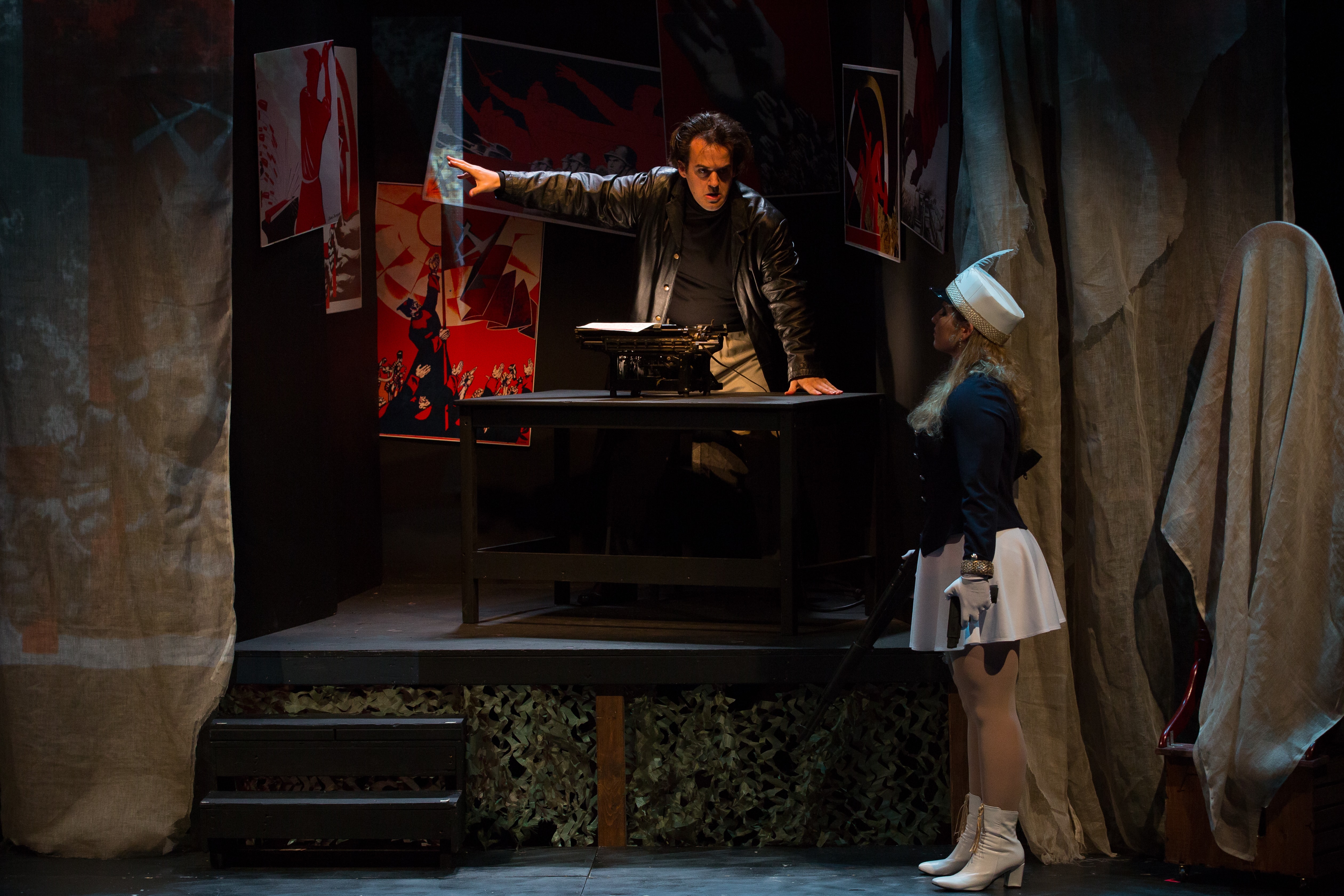The Emperor of Atlantis—an operatic takedown of autocracy—is relevant to our times in freaky and haunting ways. And its backstory is chilling.
Near the end of World War II, the Czech composer Victor Ullmann and poet Peter Kien were both incarcerated in Theresienstadt, the concentration camp set up by the Nazis as a propaganda ploy to showcase its purported cultural life. In 1943, shortly before Ullman and Kein were sent to death in Auschwitz, they created the one-act opera The Emperor of Atlantis. The Nazis censored the work; it was rehearsed but never performed. But the opera survived—and who could have predicted how aptly it would land in DC right now?

As staged by The In Series in a cheeky, idiomatic translation by Nick Olcott (who also directs), The Emperor of Atlantis is a mesmerizing musical head-trip about dictatorship and its discontents. There is much that can be said about the music, the performances, the In Series production (see David Siegel’s review), but what knocked me out most was the acid wit and audacious irony in the narrative.
The libretto scathingly satirizes the megalomania of the titular Emperor. This, for instance, is a speech delivered on his behalf by his official emissary, The Drum Major:
Thou shalt have no other emperor before me because you love me.
The time has come to restore Atlantis to greatness!
Sound familiar? There’s more.
Civilians must work night and day to keep the foreign scum at bay!
Remember… If you are not with me you are against me.

The original librettist, who was young at the time (he died at 25), obviously wrote the part of the Emperor with Hitler in mind (“There is no truth but his”). Kien’s text minces no words about Der Führer’s maniacal obsession with Aryan supremacy:
Those who are dang’rous are standing beside you.
And they are: anyone who is diff’rent! Danger lies in diff’rence.
Danger lies in diff’rence. We must fight it!
Look your neighbors up and down.
If they don’t look like us, or worship our gods, they’re a threat to our values and culture!
We must rid our land of scum & filth, inferior races and the enemies of Atlantis, the Fatherland!

The opera’s subtitle is also its most audacious jest: Death Goes on Strike. The character Death, shrouded in black and carrying a grim reaper scythe, turns out to be a bit of a wise guy. He quits, says he won’t dole out death anymore, which strips the Emperor of his power. There’s a hilarious passage when soldiers in combat and people sentenced to hang simply don’t die because Death has refused to do his job. The refrain “Any moment now death is expected” becomes a running gag.
There’s something breathtaking about concentration camp inmates creating a comic fable about death literally losing its sting. I’m aware that The Emperor of Atlantis can legitimately be attended to in somber seriousness, because of the historical horror it references. But I found its dry survivor humor wickedly funny.
The storyline continues in a sardonic vein as the Emperor decides to take credit for ending death and lauds himself for discovering the secret to immortality, which he promises to share with his subjects if they believe in him.
The Emperor, to whom you owe eternal life demands that you believe in him!
Truth is what he says it is and no one else can speak the truth but him alone now!
They feed you fake news.
Trust in him, in him.
He owns the truth.
The contemporary correlations are downright scary.
In the show’s most optimistic twist, the subjects realize they were gulled and simply stop believing the Emperor—an act of conscience that disempowers the despot even more than did Death’s work stoppage.
We thought that wisdom would always triumph in a democracy.
We were so naïve.
We believed that truth could defeat hypocrisy.
The Emperor of Atlantis is an incredibly prescient parable about the vulnerability of truth. It plays only two more performances…and then time runs out.
Running Time: Approximately 95 minutes, including an enjoyable curtain raiser (The Soldier’s Tale with music by Igor Stravinsky) and one intermission.
The Emperor of Atlantis and The Soldier’s Tale presented by The In Series, plays Saturday, June 23, 2018, at 8 pm and Sunday, June 24 at 2:30 pm, at the Atlas Performing Arts Center – 1333 H Street, NE, in Washington, DC. For tickets, call the box office at 202.399.7993 ext. 2, or purchase them online.





